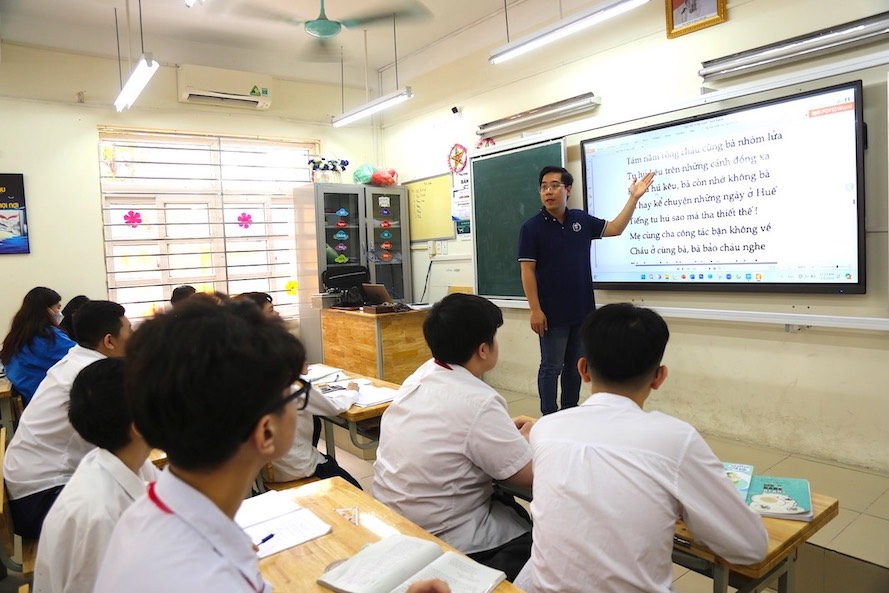On June 16, 2025, the 15th National Assembly officially passed the Law on Teachers - the first specialized law that fully stipulates the legal position, rights, obligations and policies for the teaching staff.
The Law on Teachers consists of 9 chapters and 42 articles, effective from January 1, 2026.
Affirming the position, protecting the honor and reputation of the teaching profession
According to the Law on Teachers, for the first time, non-public teachers are recognized as a special profession, with similar professional standards, rights and obligations, not just as contract workers as before.
The law clearly stipulates the right to respect, protect honor and dignity and a strict mechanism for handling acts of insulting teachers, including prohibiting individuals and organizations from disseminating information on teacher gathering without an official conclusion from the competent authority. This is to protect teachers from unreasonable social pressures and maintain a safe and civilized pedagogical environment.
Teachers' salaries are ranked highest in the administrative career salary scale system
The Law on Teachers stipulates that "Teachers' salaries are ranked highest in the administrative career salary scale system" and assigns the Government to specify in detail the salary policy for teachers.
This is an important basis for the Government to have adjustment regulations related to teachers' salaries to ensure the policy of "highest ranking".

In the Draft Decree regulating salary policies, allowances, support and attraction regimes for teachers in the draft Law on Teachers, the Ministry of Education and Training (MOET) plans to advise the Government to rearrange the salary tables of some titles of teachers (such as preschool, general education, university admission, Grade IV vocational education teachers, etc.) to ensure consistency in the salary table applicable to the professional titles of teachers and civil servants in other fields and fields; at the same time, ensuring the standard of living of teachers, helping teachers feel secure in their work and dedication to the education cause.
In addition, according to the provisions of the Law, teachers are also entitled to additional special allowances, responsibilities, incentives, allowances for disadvantaged areas, allowances for integration, seniority, mobility, etc., contributing to increasing comprehensive income.
Preschool teachers are allowed to retire up to 5 years early
Preschool teachers who wish to retire 5 years earlier than the maximum without having their pension reduced (if they have paid social insurance for 15 years). Meanwhile, professors, associate professors, doctors or teachers working in specific fields are allowed to retire at an older age to retain talent. The law converges two standard systems (professional title and professional title) into a title system associated with professional competence standards, applied consistently to both the public and non-public.
In addition, the Law on Teachers also stipulates policies to protect, support, and attract high-quality human resources; standardize and develop teams to improve the quality of education.
Notably, the Law stipulates a mechanism to protect teachers from acts that violate honor, dignity, and reputation, especially the prohibition of spreading false information on social networks without an official conclusion. These acts will be handled according to the provisions of the law.
In addition to the right to protection, teachers are also responsible for maintaining professional ethics. Strictly handling violations contributes to improving the status of teachers, while maintaining pedagogical standards in the educational environment.
Giving the initiative to the education sector
The Law on Teachers gives the education sector the initiative in recruiting and using teachers. In particular, unify the authority to the education sector to proactively recruit teachers, decentralize the recruitment authority to heads of public higher education institutions and vocational training institutions that are autonomous in recruiting teachers.
The Law assigns authority to the Minister of Education and Training to regulate the authority to recruit teachers in preschool, general education, and continuing education institutions.
The authority of the Education sector in recruiting and using teachers is an important adjustment to remove "bottlenecks" in policies for teachers, especially solving the problem of over-the-top shortage of teams; proactively coordinating and planning short-term, medium-term and long-term team development plans in the future.
Immediately after being approved by the National Assembly, the Ministry of Education and Training has urgently developed 2 Decrees and nearly 20 Circulars guiding the implementation to be issued simultaneously with the Law effective on January 1, 2026.
This document system will concretize the policies of the law, ensuring consistency, feasibility and effectiveness when put into practice.








